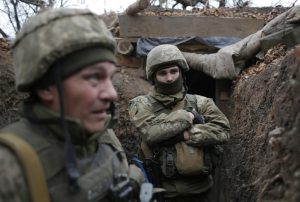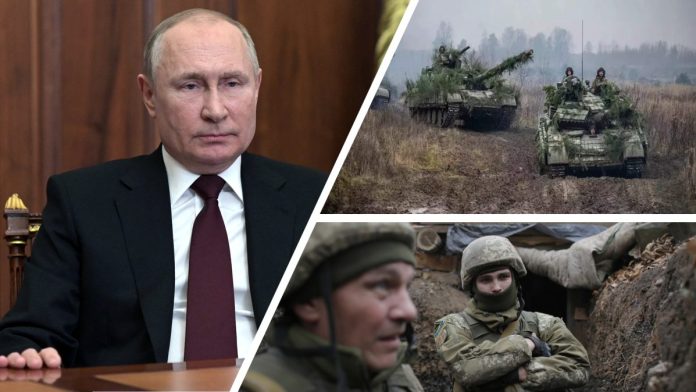On this day, February 24th 5:45 AM Moscow Time, Russian President Vladimir Putin declared that “I have made the decision of a military operation.” The previous hours had been filled with fears of an imminent Russian invasion of the Eastern European country of Ukraine, which shares a border with Russia. Putin, who had been marshalling nearly 150,000 Russian troops near the border of Ukraine, has long since seen Ukraine as a part of Russia. To him, the war is a war of reunification, not of conquest. He also laid out remarks to other nations who may want to intervene in Ukraine’s favor: “I have a few words for those who could feel tempted to interfere with ongoing developments: whoever tries to impede us, let alone create threats for our country and its people must know that the Russian response will be immediate and lead to the consequences you have never seen in history.”
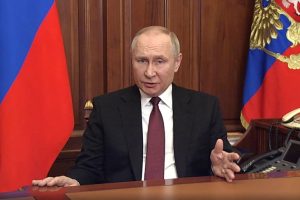
“President Putin, in the name of humanity, bring your troops back to Russia, in the name of humanity, do not allow to start in Europe what could be the worst war since the beginning of this century.”
Ukrainian Response
A state of emergency has been declared in Ukraine. Reservists have been called up, a curfew put in place, and martial law declared. Minutes later, an emergency United Nations meeting was conducted in the late night in New York City to condemn Russia’s actions at the request of Ukraine. Secretary-General Antonio Guterres of the United Nations stated: “President Putin, in the name of humanity, bring your troops back to Russia, in the name of humanity, do not allow to start in Europe what could be the worst war since the beginning of this century.” The Ukrainian ambassador to the UN was then notified during his speech, that bombing had occurred across his country. He would go on to tell his Russian counterpart that “there is no purgatory for war criminals, they go straight to hell, ambassador.”
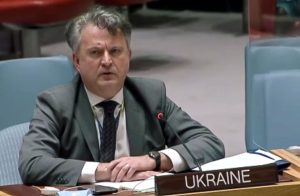
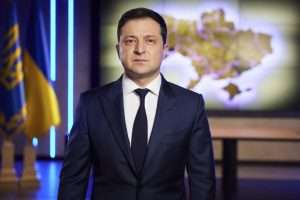
“When you will be attacking us, you will see our faces, not our backs, but our faces.”
Ukrainian President Zelensky stated in a speech to Russia in that same evening: “Today I initiated a phone call with the president of the Russian federation. The result was silence. Though this silence should be in Ukraine… We know for sure that we don’t need the war. Not a Cold War, not a hot war. Not a hybrid one. But if we’ll be attacked by the [enemy] troops, if they try to take our country away from us, our freedom, our lives, the lives of our children, we will defend ourselves. Not attack, but defend ourselves. And when you will be attacking us, you will see our faces, not our backs, but our faces.”
Russia Continues to Press Ukraine
Moments later, news reporters in Ukraine heard explosions erupt in Kyiv, the capital of Ukraine, and other cities. The explosions were heard near the Kyiv airport, where Ukrainian military assets are located. The source of these explosions is thought to be Russian ballistic missiles, selectively targeting Ukrainian military installations and assets throughout the country. Adding to this, there are reports of Russian amphibious landings in Southern Russia. And video footage captured images of Russian armored vehicles crossing the border from Belarus (a country to the north of Ukraine that is a staunch ally of Russia) into the north of Ukraine.
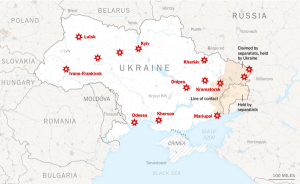
“The world will hold Russia accountable.”
When news of invasion spread, the stock market plummeted, the Russian Ruble (the currency of the Russian federation) plunged, and prices of oil surged to $105 a barrel. This will likely lead to a surge in gas prices across the country. Then leaving the global economy in a downturned state for months. However this could also lead to Russia’s economy collapsing as well. So far there has been promises by the western governments to use economic sanctions – which would significantly harm the Russian economy and perhaps convince them to halt their invasion.
Condemnation of Russia’s Actions Ensues
In an afternoon address to the nation on February 24th, President Biden unveiled economic sanctions against Russia. The overall plan was to limit “Russia’s ability to do business in dollars, euros, pounds and yen to be part of the global economy” as the President stated. Biden stated that he would sanction the 4 largest Russian banks that all together have “1 trillion in assets.” When asked on the strength and impact of these sanctions, Biden stated that “sanctions are as effective as bullets, missiles, and tanks.”

World leaders were swift in their condemnation of the invasion. U.K Prime Minister Boris Johnson stated that “Our mission is clear: Diplomatically, politically, economically and eventually militarily, this hideous and barbaric venture of Vladimir Putin must end in failure.” U.S President Joe Biden, in a late night statement, said: “President Putin has chosen a premeditated war that will bring a catastrophic loss of life and human suffering. Russia alone is responsible for the death and destruction this attack will bring, and the United States and its Allies and partners will respond in a united and decisive way. The world will hold Russia accountable.”
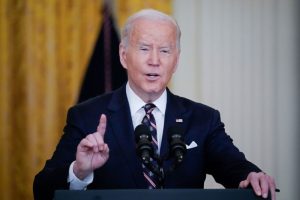
Despite the general unity among western nations in agreeing to punish Russia for the war, the past few weeks represents a failure to significantly deter Putin, whether politically or economically. As the Associated Press reports, “Weeks of diplomatic cajoling, global crisscrossing of leaders and foreign ministers, and the threat of sanctions against Putin’s inner circle had failed to persuade the Kremlin not to plunge Europe into one of its biggest crises since the end of the Cold War.”
“They’ve gotten exactly what they wanted, panic and destabilization.”
In Ukraine, hysteria, determination, and fear for the future are abound throughout the population. As the New York Times reports: “Ukrainians rushed to take shelter in bus and subway stations. In Kyiv, people packed up their cars and waited in long gas lines on their way out of the city.” One Ukrainian told the times: “It’s panic, don’t you see? They’ve gotten exactly what they wanted, the ones on the other side, panic and destabilization.” Although martial law has been declared in Ukraine, civilians are fleeing westward, particularly in the eastern half of the country where the threat of attack is imminent. Other Ukrainians are pledging to stay and fight. As the Guardian reports “the Russian invasion has brought the country together in crisis.” “The whole country will be fighting back, there will be a massive resistance,” declared Serhiy Kryvonos, a retired special forces general and former deputy secretary of the national security and defense council.
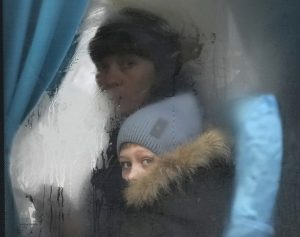
Some fear that this will lead to a large scale humanitarian crisis in Europe, as the invasion leads to more intensive fighting, forcing civilians to flee westward for safety. Streets throughout the country are bare, as sirens blare out as warnings against Russian missile attacks. Local Ukrainian government officials plead their citizens to stay calm.

“The armed forces of Ukraine are waging heavy combat”
As of now, fighting rages on across Ukraine. “Military infrastructure at Ukrainian army air bases has been rendered out of action,” Russia’s Defense Ministry declared. “Ukraine’s air defense systems have been eliminated.” However the Ukrainian Defense Forces have asserted that 5 Russian aircraft have been shot down in the eastern part of Ukraine. Long range artillery has bombarded Kharkiv, Ukraine’s second largest city near the border with Russia.
A few months ago, Ukrainian Defense Minister Oleksiy Reznikov declared that if Russia invades, “there will be a really bloody massacre… Russians will come back in coffins.” This “bloody massacre” appears well under way. “I know that more than 40 have been killed and several dozen wounded. I am aware of nearly 10 civilian losses,” Ukrainian official Oleksiy Arestovych told reporters. It appears that despite Moscow’s reassurance that they aren’t bombing major population centers, some civilians have been caught in the crossfire.
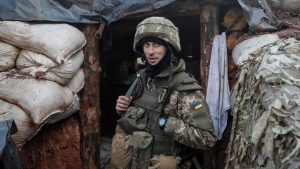
Another Ukrainian official commented: “The armed forces of Ukraine are waging heavy combat,” while adding, “We have losses. In several places, the Russian armed forces have been repelled.” All across Eastern Ukraine, prepared defensive positions have been erected throughout the years to fight the separatists since 2014. Now these trenches are being used to defend against Russian ground troops and missile strikes. In the north of the country, Russian troops have seized Chernobyl, the site of the world’s worst nuclear power plant disaster. Filled with radiation, the Chernobyl Exclusion Zone is a 1,004 mile zone that is restricted to all due to radiation. Now however it will see heavy combat at Russian troops attempt to push through the outskirts of the Exclusion Zone (avoiding most of the radiation) to drive on Kyiv from the north.
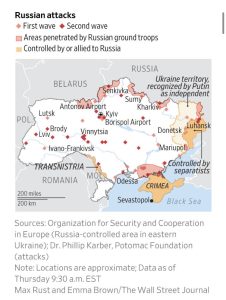
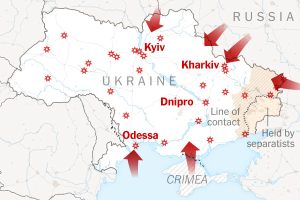
“The Russians will own the land and sea.”
Ukraine likely will not hold out long against Russia. It is severely outnumbered and outgunned, and Russia will, in the words of retired U.S Army four star general Philip Breedlove, “Own the air and sea.” Ukraine will offer stout resistance, as they fight for their very existence as a nation. However when faced against the world’s 5th largest military, there is not much this small nation can do.
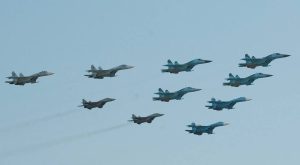
Ukraine, a former member of the USSR, has around 209,000 men at its disposal. It also has around 200,000 reservists and another 500,000 civilians who have received military training. The quality of Ukraine’s army is adequate for defensive purposes, although as the war drags on Ukraine will find itself short of experienced troops, armored vehicles, and specialized equipment. Russia by contrast has nearly 900,000 men at its disposal. It has another 2,000,000 reservists, who will be used to replace losses as the war goes on. From a military standpoint, Ukraine could offer a few weeks or months of military resistance, but would soon collapse under the inevitable attrition.
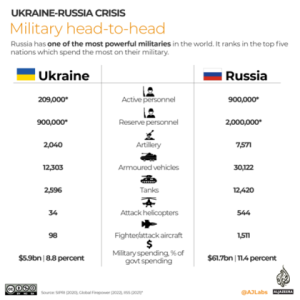
The U.S has alleged that “Russian forces are creating lists of identified Ukrainians to be killed or sent to camps following a military occupation,” as American ambassador to the United Nations Bathsheba Crocker states. According to Crocker, the targets are likely to include Russian and Belarusian dissidents who have fled to Ukraine, reporters, activists, and “vulnerable populations such as religious and ethnic minorities and LGBTQI+ persons.”
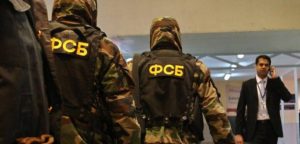
“Putin’s invasion of Ukraine is the start of a grim and unpredictable new chapter in history.”
The effects of Putin’s invasion will be profound. The economy will likely sag, bringing gas prices up to their highest level. Thousands will likely die or be displaced, and Ukraine will see massive damage to its infrastructure and cities. Many will flee to foreign nations seeking safety. This brings us back to a question often asked towards Putin: “Why?” What is the justification for invading Ukraine? For a small nation with scant natural resources, there appears to be no economic motive for invasion. And for a nation that has shown immense hostility towards Russia, there will inevitably be many deaths. If Putin seeks to reunite two peoples, who have “the same history” as he states, then he wouldn’t see much success in Ukraine. Putin, a former Soviet KGB officer, has been labeled as “political and strategic genius” by Western analysts.
Perhaps Putin sees some long term benefit from invading Ukraine, another step in his goal of strengthening Russia to its Cold War might. The Asia Times reports: “It’s become a common assessment of Russian leader Vladimir Putin that he is chronically unpredictable.” Moreover, the invasion will be the beginning of a new geopolitical era in Europe. As Forbes’ David Meyer puts it, “Putin’s invasion of Ukraine is the start of a grim and unpredictable new chapter in history.” The aggression by the Russian Federation may spur other nations, like China, to be more aggressive with their less powerful neighbors. The invasion may also split NATO, and cause dissent in western countries over the souring economy and high gas prices. The Western alliance may look weak and vulnerable, able to be bullied around by other powerful states.
But as for now in the present, these long term goals and effects from this invasion matter little. As of now, February 24th, 2022, the first day of a long and bloody war dawns on Europe.
